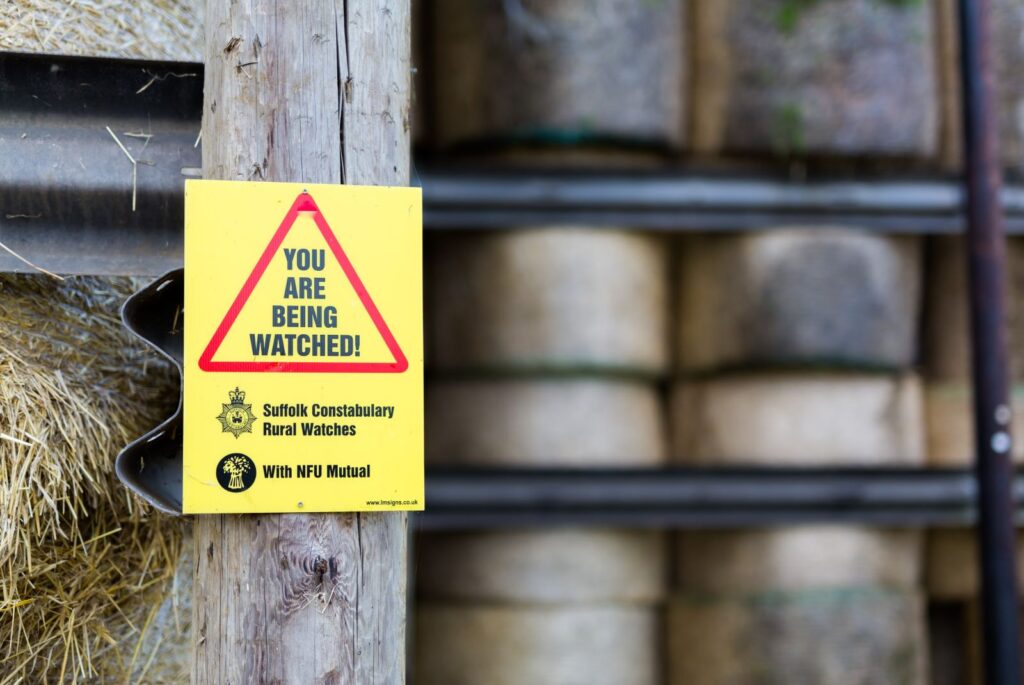Report highlights steep rise in the cost of rural crime
2nd August 2023
The latest NFU Mutual Rural Crime Report reveals an alarming increase in criminal activity across the British countryside, with the total cost of rural crime adding up to an estimated £49.5m, a steep rise of 22% from the previous year.
According to the report published today (1st August), the primary driving force behind the rising trends is global events such as the Ukraine conflict opening up illicit markets and creating more demand for stolen machinery.
As a result, farmers and rural communities have been increasingly targeted by criminal gangs, compounding financial worries caused by the cost-of-living crisis. The knowledge of being exposed and watched is also having a negative impact on well-being and mental health in rural areas, many of which are already suffering from isolation and loneliness.
Following a decline throughout 2020 and 2021, figures show that rural crime is now hitting pre-pandemic levels. In 2022, quad and ATV theft reported to NFU Mutual cost £3m nationally, a 34% rise on the previous year.
Meanwhile, GPS theft increased by 15% to £1.8m last year, with the problem escalating further in the first four months of 2023, doubling costs to over £500,000 compared to the same period last year.
Livestock theft remains one of the costliest crimes to farming, with an estimated £2.7m damage incurring farmers in 2022, a rise of 8.7% on the previous year. The cost of dog attacks on livestock has also increased by more than 50% between 2019 and 2022 as the so-called ‘pandemic puppies’ came of age.
Of all crimes involving theft, trailer thefts have seen the biggest increase last year, with figures up 66% at £2.9m.
NFU Mutual Chairman Jim McLaren wrote in the report: ‘Rural thieves are no longer opportunists from the nearest town. Today, crime is controlled by organised and often international gangs, and world events and new illicit markets have an impact on the demand for stolen kit.
‘As well as criminals trespassing on farms to scope out properties, NFU Mutual has also received reports of thieves using drones and other technology to identify targets.
‘The costly issue of rural crime impacts lives and livelihoods as it puts additional pressure on farming families who may feel vulnerable knowing that homes and workplaces are being watched.’
In a survey of 175 NFU Mutual Agents, 80% of respondents said rural crime is disrupting farming activities, while 70% knew of farmers who had been repeat victims of rural crime. Moreover, 86% agreed thieves are cashing in on the limited supply of vehicles and rising prices.
With the UK facing increasingly sophisticated and determined criminals, NFU Mutual is providing financial support and expertise to help establish a new rural crime police unit, which will co-ordinate efforts against rural crime nationally and help shape best practice to provide a platform to fight back.
The organisation is also working alongside police, rural communities and its network of local agents to tackle the issue, and has invested over £400,000 in rural crime initiatives.
Greater collaboration needed to curb rural crime
Responding to the report, NFU Vice President David Exwood said:
“As the NFU Mutual’s report highlights, over the past 18 months highly organised gangs of criminals have continued to plague the British countryside, stealing livestock, high-value farm machinery and expensive GPS equipment, as well as trespassing on private land and regularly fly-tipping tons of rubbish.
“The huge increase we’ve seen in criminal activity is significantly impacting farm businesses and farming families both financially and emotionally, with many rural communities left feeling vulnerable and intimidated. All at a time when the industry is facing numerous other pressures, not least soaring production costs.”
Mr Exwood said it was reassuring to see the Equipment Theft Prevention Bill granted Royal Assent in recent weeks, as a result of collaboration between the NFU, NFU Mutual, government and other industry organisations.
“This new legislation gives the Home Secretary wider powers to make regulations that will deter the theft and resale of quad bikes and ATVs. Fitting immobilisers and adding forensic markings will also ensure that owner details are registered to help make these essential farm vehicles less attractive for criminals to steal.
“There also needs to be much more of a collaborative approach to tackle rural crime,” Mr Exwood added. “The National Rural Crime Unit is a great example of farmers, policymakers and police forces working together effectively at national and local level to examine ways of how UK farming businesses can be protected from criminal gangs.”

